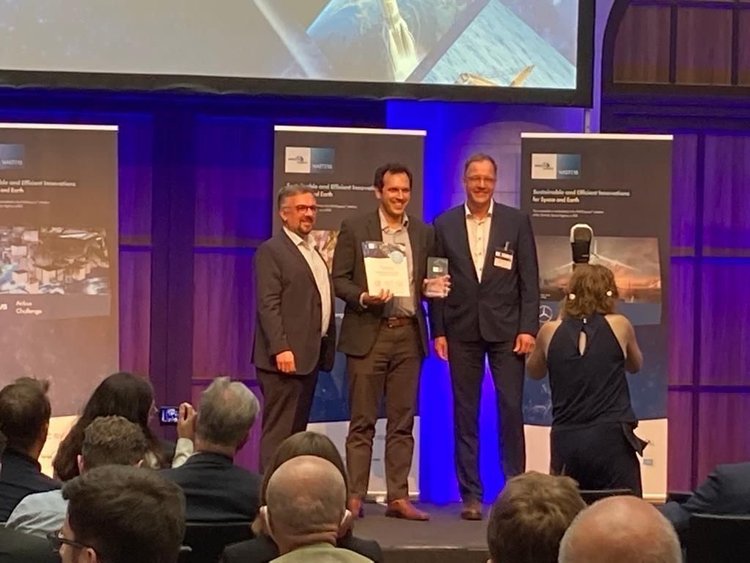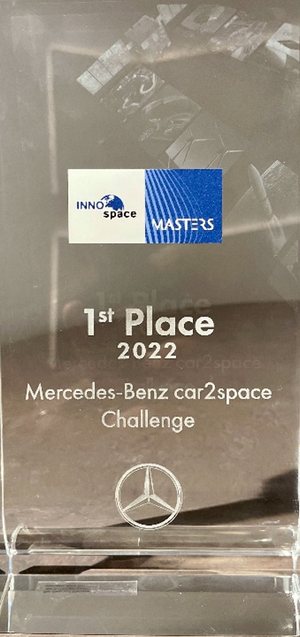July 06, 2022
Mercedes-Benz AG – Car2Space Award
By Mahmoud Khafagy
Two undeniable modern necessities are the mobile phone and the car. A third necessity is just-in-time logistics to enable rapid delivery by companies like Amazon, FedEx, UPS, and DHL. A fourth emerging service, which is becoming a necessity for some, are rideshare services like Uber and Lyft. And a fifth emerging service, which may become a necessity, includes services like Doordash, Ubereats, GrubHub, and Instacart. Lynk supports all of these use cases. How do we do this? Lynk enables a new era of always-connected cars, trucks, drones, airplanes, and off-road vehicles using satellite-cell-towers-in-space.
Lynk recently won first place in Mercedes-Benz’s car2space Challenge at INNOspace Masters Conference 2022 for our innovative technology that connects existing cars everywhere, with no change to the car using Lynk’s satellite cell-tower-in-space technology. Lynk’s “sat-to-car” solution is entirely different from every other solution proposed by satellite IoT firms. Lynk’s satellite technology is built into hundreds of millions of cars already on the road. Lynk’s solution requires zero hardware or software change to these existing cars to stay connected.

Lynk has already proven that our satellites connect to every vehicle, including cars, trucks, and John Deere tractors, using existing 3GPP standard chipsets. More importantly, Lynk’s system provides resilient connectivity when needed most – during emergencies. That’s because Lynk’s cell towers in space are not impacted by tsunamis, hurricanes, earthquakes, fires, blizzards, tornados, or other Earth-based catastrophes that can damage ground-based cell towers. Uniquely, Lynk’s space-based network of satellites offers a reliable alternative to keep vehicles of all sorts connected regardless of location.
Unconnected vehicles and their owners total in the hundreds of millions. By allowing those vehicles to be connected everywhere, it will solve the problem for many use cases, including:
- There are over 1 billion cars worldwide and nearly 80 million new cars manufactured in 2021. Increasingly, common features in cars today are things like OnStar, LoJack, and critical maintenance alerts. While these services ensure safety, security, and critical maintenance, they only work if the car is connected. Disconnectivity is a safety issue. Lynk believes that car purchasers will want these services to work everywhere, and universal connectivity will become a critical “reason to buy” at the point of sale.
- 21st Century autonomous tractors and ag robotics are huge productivity enhancers, but they need to operate in rural and remote communities, which generally have very poor connectivity. Taking the cell tower to the farm is really hard, and you can’t bring the farm to the city. One primary challenge for an autonomous tractor is what to do when it detects an obstacle. Does it go over, around? Does it turn around or wait? In this case, the tractor needs to send a picture to the farmer and ask for guidance. Reliable and affordable connectivity is required. True precision agriculture won’t be possible without affordable and ubiquitous connectivity on the farm. Further, if a farmer gets injured in the field, they won’t be able to call for help if their farms lack mobile network coverage. Lynk solves both problems with the existing cellular RF chip already in the tractor and the mobile phone in the farmer’s pocket.
- Whether remote piloted or autonomous, drones require ubiquitous connectivity for telemetry, tracking, and control (TT&C). What does a drone without TT&C do? It turns around or lands. Connectivity is a hard limit on what jobs a drone can do. If a drone loses control or breaks down in flight, it might crash into something, break down and land on somebody’s property, or travel into restricted airspace. Continuous TT&C will be a regulatory requirement for safe operations. Lynk solves this problem with the existing cellular RF chip already in the drone
- Just-in-time package delivery, and minute-by-minute updates and tracking, is touted by companies such as FedEx, Amazon, and UPS. But just-in-time delivery and up-to-the-minute updates on when something will be delivered requires universal connectivity. What if the truck breaks down, or the driver takes a break where there is a black spot? How will the logistics company know? They can’t. Lynk allows delivery trucks to stay connected everywhere with the cellular RF chip already in the truck.
- How about Uber and Lyft’s problem serving people in rural and disconnected areas? How about Doordash, Grubhub, and Instacart? If the customer is disconnected, they can’t even order a pickup or a delivery. And they certainly can’t provide a precise update for showing up. Lynk also solves these problems with the existing phone already owned by the drivers.
- People driving adventure vehicles such as ATV’s, snowmobiles, and dune buggies want adventures, but they want to ensure their safety while doing so. And their loved ones worry about their safety too. One of the most significant barriers to buying and using an adventure vehicle is safety. Think about it – if you are in the market for an ATV or snowmobile, and one brand features built-in universal connectivity for emergencies, which brand would you buy?
- Boating on the sea is dangerous, and fishing is one of the most dangerous occupations in the world. Fishing community members have a greater chance of dying than police officers or firefighters. Part of the reason is they work in remote and disconnected areas, and a storm can arrive without advance warning at a moment’s notice. And the fishing boat can break down. The solution in both cases is connectivity. Lynk can affordably connect millions of fishing boats serving rural communities everywhere in the world with just the existing phone in their pocket.
Today, only 10% of the world’s surface is covered by terrestrial mobile connectivity. This means that 90% of the planet is in “coverage black spots,” otherwise known as “0G.” Over three billion people per year with a mobile phone experience extended periods of disconnectivity. Another billion people per year refuse to buy their first phone because they don’t have mobile coverage where they live and work. 0G is a problem for four billion people.
Backward Compatible
With accolades from the Mercedes-Benz team, Lynk’s technology can provide satellite-direct-to-phone service to those four billion people and billions of cars, tractors, trucks, ATV’s, snowmobiles, and other connected vehicles. In addition, cars and vehicles can use existing built-in chipsets to reach Lynk’s network providing drivers with critical emergency services wherever they are on Earth. And because the Lynk system is backward compatible, the legacy chipsets that exist in millions of cars will still work even after the sunset of legacy cellular technologies.

As vehicle manufacturers look to ensure the safety of the customer, they serve their customers on two fronts: standard IoT chipsets and pricing. Standard 3GPP IoT chipsets already exist in many cars produced today, with connectivity everywhere using those standard chipsets eliminating the need to add customized IoT chipsets.
More than a dozen satellite companies are trying to provide IoT satellite services, all of which are sub-optimal because they ask the end customer to adopt a non-standard service. Because they are non-standard, they are all more risky and costly than necessary. They have company names such as Iridium, Globalstar, Orbcomm, Inmarsat, Astrocast, Myriota, Lacuna, Kineis, Kepler, Swarm, Hiber, Skylo, Fleet, Sateliot, CASC/CASIC, Galaxy Space, OQ, Totum, Omnispace, Ingenu, Eutelsat (Sigfox) and Kaskilo.
Lynk is entirely different than all these companies. We are a new category of satellite service. By using standard 3GPP chipsets for connecting vehicles, car manufacturers avoid adopting new or potentially incompatible technology. Drones already use standard cellular RF chips. Trucks and tractors as well. Leveraging Lynk’s proven service and the existing 3GPP standard already built into their cars, trucks, tractors and drones minimizes the risk to original equipment manufacturers and lowers their production costs. We believe that universal connectivity will become a significant safety feature vehicle manufacturers’ will offer and consumers will demand.
Lynk proved its patented technology through a series of demonstration missions, receiving regulatory approval for testing in 15 countries. Lynk Tower 1, Lynk’s first commercial-ready satellite, launched in April 2022. Additional satellites will be launched later this year, enabling Lynk to provide a constellation of commercial “cell-towers-in-space” service. To date, Lynk has 12 contracts with Mobile Network Operators worldwide.
It was an honor to accept the car2space award at the INNOspace Masters Conference on behalf of Lynk. I look forward to the ongoing built out of the constellation of satellites in space that will connect humans and their vehicles now and into the future.